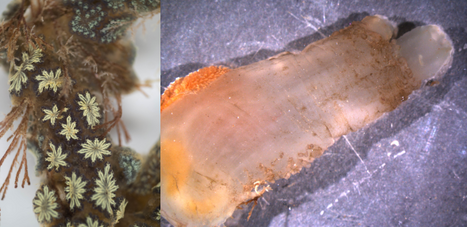
SPOTLIGHT: Developmental Biology and Morphogenesis
Pubblicato il: 14.02.2020 10:00
Chordata represent a phylum of deuterostome animals including invertebrates such as lancelets (cephalochordate) and sea squirts (tunicata), collectively called protochordates, and vertebrates. Therefore, the invertebrate-vertebrate transition, and the consequent whole genome duplications, occurred within this phylum and the study of the biology of invertebrate chordates can contribute to elucidate various aspects of the above transition.
Our Research unit is mainly focussed on the study of chordate evolution, with particular reference to tunicates, the sister group of vertebrates, their biology and their adaptive strategies. The research is mainly concentrated on the colonial species Botryllus schlosseri and the solitary species Ciona robusta, and regards sexual and asexual reproduction, development and evolution of nervous system and immune responses.
These two species are very common in the Lagoon of Venice, where we can collect them and rear at the Hydrobiological Station of the Department of Biology at Chioggia. We can also culture animals in aquaria at the Department of Biology for their daily analysis. We have developed several methods and tools to study them, such as light, confocal, and electron microscopy, transcriptomics, cell sorting, and cell culture. Moreover, we can dissect animals for experimental studies aimed to study their potential for regeneration and stemness.
Main research themes are the following:
1. Ascidian Evo-Devo
Comparative analyses of embryonic and development and budding in colonial ascidians from a morphological and transcriptomic point of view; adult stem cells in budding and regeneration; nervous system development during both sexual and asexual development, and aging; evolution of sensory cells in chordates.
2. Immunobiology of tunicates
Study of immune responses in relation to the evolution of defence system in chordates, with particular reference to the role of haemocytes, complement system and cytokines. Study of allorecognition with particular reference to the molecular basis of self-nonself recognition. Search for bioactive molecules and immunomodulatory activity: isolation and characterisation of antimicrobial peptides, lectins, heparin-histamine system and histamine-receptors, molecules with proinflammatory activity.
3. Stress responses of ascidian haemocytes in relation to anthropic activities.
Study of the expression of antioxidant and immune-related genes by haemocytes from ascidians (both solitary and colonial) from sites characterised by various anthropic pressures.
4. Study of the composition of the macrofouling biocoenosis on hard substrata for the estimation of the environmental quality
Evaluation of biofouling dynamics and analysis of the ecological succession of hard substrates in the Lagoon of Venice, characterised by a high biodiversity and a climax described today as “Botryllus community” as it consists primarily of botryllid ascidians and, to a lesser extent, bryozoans, barnacles, serpulids, chlorophyta and rhodophyta. Search for ecological-friendly antifouling systems with a low environmental impact.
Members of the Research Unit: Loriano Balllarin (loriano.ballarin@unipd.it), Francesca Cima (francesca.cima@unipd.it), Fabio Gasparini (fabio.gasparini@unipd.it), Lucia Manni (lucia.manni@unipd.it).
PhD students: Anna, Peronato (annaperonato@gmail.com), Virginia Vanni (virginia.vanni@phd.unipd.it), Roberta Varello (roberta.varello@studenti.unipd.it)
Additional information at: https://sites.google.com/site/ascidianbiologylab/home





